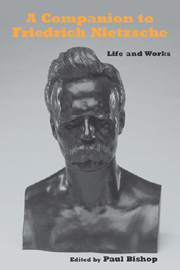Book contents
- Frontmatter
- Contents
- Acknowledgments
- A Note on Editions and Abbreviations
- Introduction
- Link to Nietzsche's Early Writings
- Link to The Birth of Tragedy
- Link to Untimely Meditations
- Link to Human, All Too Human
- Link to Daybreak
- Link to The Gay Science
- Link to Zarathustra
- Link to Beyond Good and Evil
- Link to On the Genealogy of Morals
- Link to The Case of Wagner and Nietzsche contra Wagner
- Link to Twilight of the Idols, The Anti-Christ, and Ecce Homo
- Link to the Nachlass
- Conclusion
- Notes on the Contributors
- Index
Link to Twilight of the Idols, The Anti-Christ, and Ecce Homo
Published online by Cambridge University Press: 05 February 2013
- Frontmatter
- Contents
- Acknowledgments
- A Note on Editions and Abbreviations
- Introduction
- Link to Nietzsche's Early Writings
- Link to The Birth of Tragedy
- Link to Untimely Meditations
- Link to Human, All Too Human
- Link to Daybreak
- Link to The Gay Science
- Link to Zarathustra
- Link to Beyond Good and Evil
- Link to On the Genealogy of Morals
- Link to The Case of Wagner and Nietzsche contra Wagner
- Link to Twilight of the Idols, The Anti-Christ, and Ecce Homo
- Link to the Nachlass
- Conclusion
- Notes on the Contributors
- Index
Summary
Turin forms the backdrop to Nietzsche's most productive year, and his last year of sanity: in addition to The Case of Wagner (Der Fall Wagner), published in September 1888, and Nietzsche contra Wagner (a series of selections from his earlier writings, first published in 1889 and then again in 1895), 1888 saw the preparation of three new works, Twilight of the Idols (Götzen-Dämmerung), The Anti-Christ or The Anti-Christian (Der Anti-Christ), and Ecce Homo, all published posthumously — all of which stand in some relation or another to Nietzsche's final philosophical project. This work is (or a part of it) is referred to variously as The Will to Power (Der Wille zur Macht), The Innocence of Becoming (Die Unschuld des Werdens), or The Revaluation of All Values (Die Umwerthung aller Werthe), to name the texts that have been published in various (and controversial) selected forms and are available in their raw, unedited state in the final volumes of the KGW or the KSA.
When Nietzsche first visited Turin in the spring of 1888, he was delighted: “This is really the city I need now!” (Das ist wirklich die Stadt, die ich jetzt brauchen kann!), he enthused to his friend Heinrich Köselitz (or Peter Gast) on 7 April 1888, “in the evening on the bridge over the Po: magnificent! Beyond Good and Evil!!” (Abends auf der Pobrücke: herrlich! Jenseits von Gut und Böse!!; KSB 8, 285–86).
- Type
- Chapter
- Information
- A Companion to Friedrich NietzscheLife and Works, pp. 309 - 314Publisher: Boydell & BrewerPrint publication year: 2012



